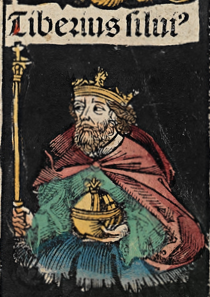Tiberinus Silvius on:
[Wikipedia]
[Google]
[Amazon]
 Tiberinus (said to have reigned 922-914 BC) was the ninth king of
Tiberinus (said to have reigned 922-914 BC) was the ninth king of
 Tiberinus (said to have reigned 922-914 BC) was the ninth king of
Tiberinus (said to have reigned 922-914 BC) was the ninth king of Alba Longa
Alba Longa (occasionally written Albalonga in Italian sources) was an ancient Latins (Italic tribe), Latin city in Central Italy in the vicinity of Lake Albano in the Alban Hills. The ancient Romans believed it to be the founder and head of the ...
, according to the traditional history of Rome handed down by Titus Livius
Titus Livius (; 59 BC – AD 17), known in English as Livy ( ), was a Roman historian. He wrote a monumental history of Rome and the Roman people, titled , covering the period from the earliest legends of Rome before the traditional founding i ...
. He was the successor (and probably son) of Capetus, the eighth king of Alba Longa. The Alban kings claimed descent from Aeneas, a Trojan prince who brought a remnant of the Trojan populace to Italy following the sack of Troy
Troy (/; ; ) or Ilion (; ) was an ancient city located in present-day Hisarlik, Turkey. It is best known as the setting for the Greek mythology, Greek myth of the Trojan War. The archaeological site is open to the public as a tourist destina ...
(traditionally 1184 BC), and settled in Latium
Latium ( , ; ) is the region of central western Italy in which the city of Rome was founded and grew to be the capital city of the Roman Empire.
Definition
Latium was originally a small triangle of fertile, volcanic soil (Old Latium) on whic ...
. Alba was built by Ascanius, the son of Aeneas and Lavinia, and founder of the Alban royal line. The Alban kings, including Tiberinus, bore the ''cognomen
A ''cognomen'' (; : ''cognomina''; from ''co-'' "together with" and ''(g)nomen'' "name") was the third name of a citizen of ancient Rome, under Roman naming conventions. Initially, it was a nickname, but lost that purpose when it became hereditar ...
'' Silvius, after the son of Ascanius, who was said to have been born in the woods.
The only tradition specifically attached to Tiberinus is that he was drowned while crossing the river then known as the ''Albula'', but which was ever after known to the Latins as the Tiber
The Tiber ( ; ; ) is the List of rivers of Italy, third-longest river in Italy and the longest in Central Italy, rising in the Apennine Mountains in Emilia-Romagna and flowing through Tuscany, Umbria, and Lazio, where it is joined by the R ...
. This ancient river formed the boundary of Latium and Etruria
Etruria ( ) was a region of Central Italy delimited by the rivers Arno and Tiber, an area that covered what is now most of Tuscany, northern Lazio, and north-western Umbria. It was inhabited by the Etruscans, an ancient civilization that f ...
, and the city of Rome
Rome (Italian language, Italian and , ) is the capital city and most populated (municipality) of Italy. It is also the administrative centre of the Lazio Regions of Italy, region and of the Metropolitan City of Rome. A special named with 2, ...
was later founded on a group of seven hills overlooking its banks. After his death, Tiberinus was revered as the god of the river (see Tiberinus (god)). In the earliest days of Rome, the cult of Tiberinus survived at the Volturnalia, the archaic festival of Volturnus, but no details are known.
Tiberinus was succeeded by Agrippa, the tenth king of Alba Longa, and probably his son. Amongst their descendants were Romulus and Remus
In Roman mythology, Romulus and (, ) are twins in mythology, twin brothers whose story tells of the events that led to the Founding of Rome, founding of the History of Rome, city of Rome and the Roman Kingdom by Romulus, following his frat ...
, the founders of Rome (traditionally 753 BC).
Many scholars believe that the name of Tiberinus was derived from the river, instead of the other way around. The same root is thought to be the origin of the Latin ''praenomen
The praenomen (; plural: praenomina) was a first name chosen by the parents of a Ancient Rome, Roman child. It was first bestowed on the ''dies lustricus'' (day of lustration), the eighth day after the birth of a girl, or the ninth day after the ...
Tiberius
Tiberius Julius Caesar Augustus ( ; 16 November 42 BC – 16 March AD 37) was Roman emperor from AD 14 until 37. He succeeded his stepfather Augustus, the first Roman emperor. Tiberius was born in Rome in 42 BC to Roman politician Tiberius Cl ...
'', and its Etruscan cognate, ''Thefarie'', and it may be noted that ''Tiberinus'' appears to be derived from ''Tiberius'', which may have been the original form of the name. Philologist George Davis Chase believed that the same root might be found in the names of the city of Tibur, the Umbrian town of Tifernum, and the Samnite river Tifernus.George Davis Chase, "The Origin of Roman Praenomina", in ''Harvard Studies in Classical Philology'', vol. VIII (1897)
Family tree
References
{{Roman religion Kings of Alba Longa Deaths by drowning Year of birth unknown